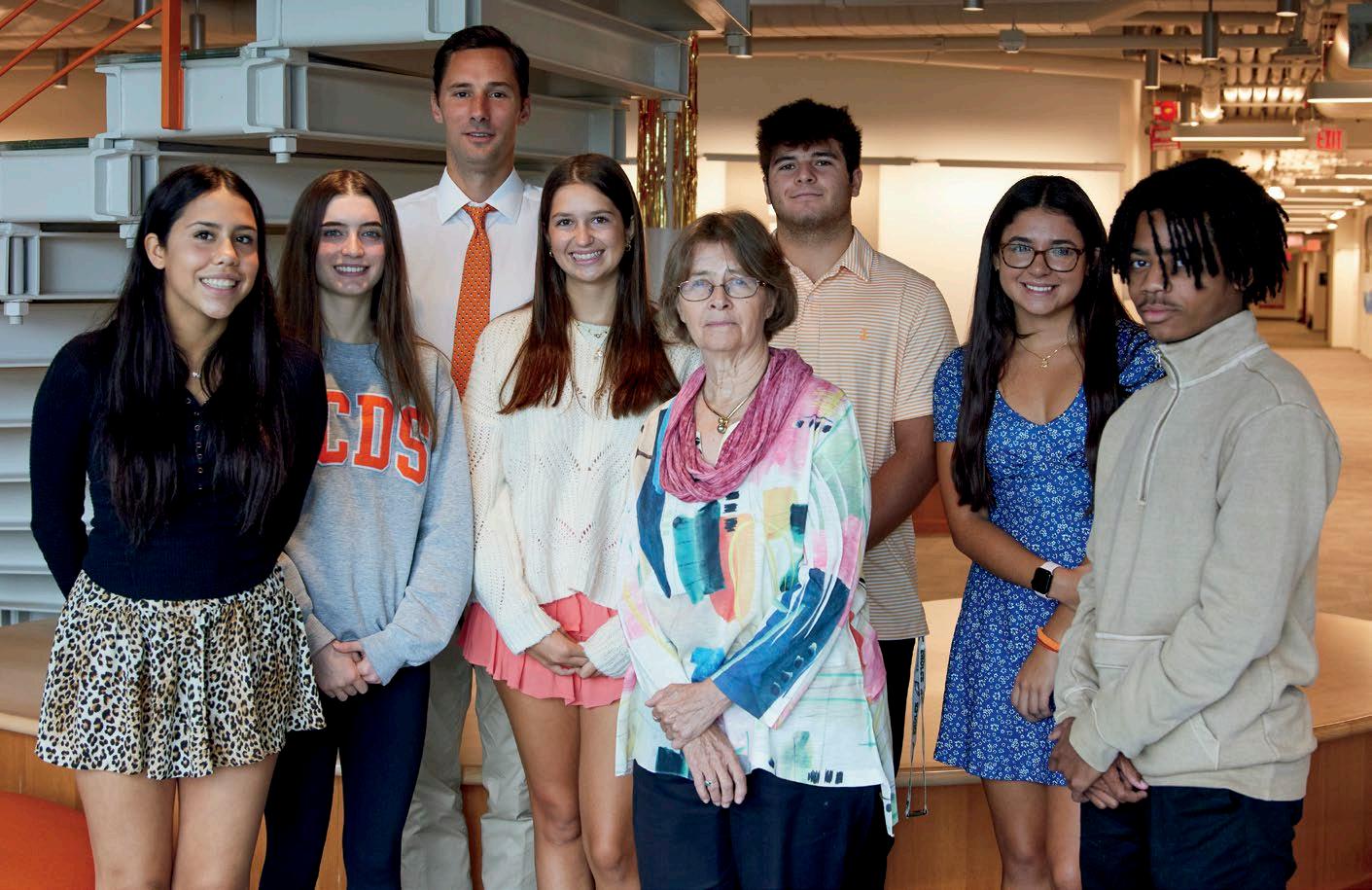
3 minute read
Democracy Requires Independent Press
Foreign Correspondent Pamela Constable ’67 Named Distinguished Alumna
AWashington Post foreign correspondent, Pamela Constable ’67 has been to Afghanistan four times since the withdrawal of American troops in August 2021. She is no stranger to the war-torn region and has worked there on and off since 1998. The takeover of the Taliban in 2021 and the countrywide food shortages have created a situation that Ms. Constable describes as a “cascade of despair.” She plans to return in the near future to give voice to the stories of ordinary Afghans.
Before returning, however, Ms. Constable made a special trip to GCDS on Oct. 14 to receive the 2022 Distinguished Alumni
Award, an honor that is voted upon annually by the Alumni Advisory Council. She addressed an audience of Grade 12 students, faculty, and several of her former classmates on the Stanwich Road campus about why she became a journalist and the challenges and epiphanies she has experienced throughout her years covering foreign conflicts and struggles.
“I have loved every minute of it—aside from a few incidents involving tropical spiders, tear gas, or men with guns,” she said.
A reporter for the past 48 years, Ms. Constable has worked for three of the most respected newspapers in the country—The Baltimore Sun, The Boston Globe, and The Washington Post—and has reported from more than 40 countries across Latin America, Asia, Africa, and the Middle East. Currently, she is a contract writer for The Washington Post ’s foreign desk. She completed a tour as Afghanistan/Pakistan bureau chief in 2019, and served as a South Asia bureau chief based in India from 1999 to 2005.

She recounted some of her many reporting adventures to the audience:

“In India, I rode with a caravan of elephants who were performing in a religious festival and accompanied a family to the Ganges River to baptize their baby boy in its polluted but sacred waters. In Iraq, I followed a squad of US Marines patrolling a neighborhood with enemy snipers hiding on the rooftop and smuggled out an abandoned puppy in a Red Cross ambulance. In Russia, during glasnost, I visited the Great Gate of Kiev and met dissidents and newspaper editors in Moscow who finally felt free to speak their minds.”
Frequently finding herself in precarious situations, Ms. Constable has had to draw on her wits and courage.
“Reporting in troubled countries involves risk and hardship, but it is just about the only job that allows you to witness and chronicle history without having to get dressed up,” she said. “The possibilities are endless and the rules are few: trust your instincts, keep asking questions, don’t drink the water, and don’t make anything up.”
Throughout her career, Ms. Constable has written about many of the political events that have shaped different regions. It is, however, the human stories and journeys of everyday people that she loves to tell most of all.
“If you work hard and immerse yourself in the story, you can capture the daily struggles and dreams and fears of people a world away, and perhaps bring them a little closer to your readers,” she said. “I have spent much of my life trying to be a communicator, to build bridges between cultures and societies, to
“If you work hard and immerse yourself in the story, you can capture the daily struggles and dreams and fears of people a world away, and perhaps bring them a little closer to your readers. I have spent much of my life trying to be a communicator, to build bridges between cultures and societies, to create empathy instead of suspicion, to find common ground rather than dwell on differences.” create empathy instead of suspicion, to find common ground rather than dwell on differences.”
Carolina Deus, editor of the Stripe Chronicle, the Upper School newspaper, had an opportunity to meet with Ms. Constable in a small group. “As someone who will hopefully someday pursue a career in journalism, it was great to hear about her experience and the lessons she had learned along the way. I now realize that it takes a lot of effort to get the right quote or interview.”
While Ms. Constable’s speech mentioned some of her career highlights and stories she was most proud of, she believes that the Distinguished Alumni Award has significance far beyond the career of one writer. “It is an opportunity to celebrate the crucial role of newspapers, and of the independent press, in the life of our nation—and to talk about why they still matter today.”

Newspapers delight, inform, and challenge readers, she said. They are also central to a thriving democracy.
These days, however, she believes the mainstream media is under attack. The papers that she has long relied on for accurate coverage as a reader and the ones where she has worked and
PAMELA CONSTABLE ’67

In addition to her work at the Washington Post, Boston Globe, and Baltimore Sun, Ms. Constable is the author of three books: A Nation of Enemies: Chile Under Pinochet, 1993, Fragments of Grace: My Search for Meaning in the Strife of South Asia, 2005, Playing with Fire: Pakistan at War with Itself, 2011.
She is the winner of the Maria Moors Cabot Award for Distinguished Reporting from Latin America from the Columbia School of Journalism and the Arthur Ross Media Award for career reporting from the American Academy of Diplomacy.
In addition, she has held writing fellowships at the Woodrow Wilson International Center for Scholars, the Alicia Patterson Foundation, and the Pew Journalism Program at the Johns Hopkins School of Advanced International Studies. She is a member of the Council on Foreign Relations and president of the Afghan Stray Animal League.










